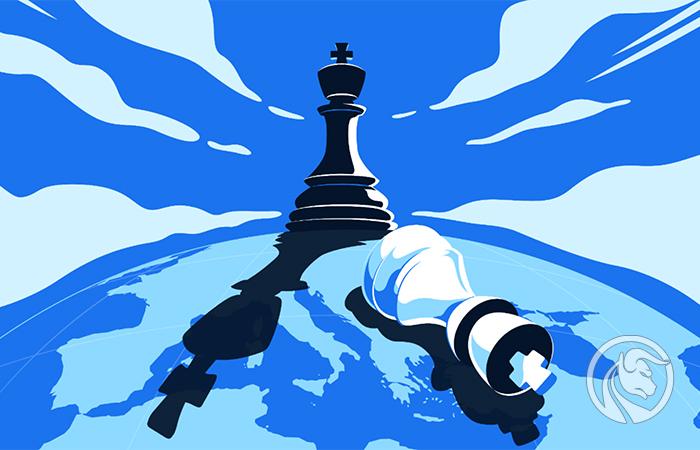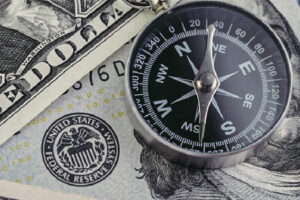Final showdown - Central banks must stay ahead of inflation
In just two years, the world economy experienced two major shocks: the Covid pandemic in 2020 and wars in Ukraine in 2022 Both of these shocks will have a significant impact on the markets, in particular on economic policy, as new geopolitical priorities have emerged. This is because significant weaknesses in the global economy have emerged, and it has turned out to be over-regulated.
This prognosis discusses the significant changes that are already taking place in global politics and macroeconomics. Gone are the days of regularly falling real interest rates and increasing financialisation; they have been replaced by new gains in productivity as we move the economic agenda to better, more rational neighborhoods, despite the gruesome humanitarian news that comes to us every day about the war in Ukraine.
About the Author
Steen Jakobsen, Chief Economist and CIO Saxo Bank. Djoined Saxo in 2000. As a CIO, he focuses on developing asset allocation strategies and analyzing the overall macroeconomic and political situation. As head of the SaxoStrats team, Saxo Bank's internal team of experts, he is responsible for all research, including quarterly forecasts, and was the founder of Saxo Bank's outrageous forecasts. Before joining Saxo Bank he cooperated with Swiss Bank Corp, Citibank, Chase Manhattan, UBS and was the global head of trade, currency and options in Christiania (currently Nordea). Jakobsen's approach to trading and investing is thought-provoking and is not afraid to oppose consensus. This often causes debate among the global market community. Every day, Jakobsen and his team conduct research in various asset classes, covering major macroeconomic changes, market movements, political events and central bank policies. With over 30 years of experience, Jakobsen regularly appears as a guest at CNBC and Bloomberg News.
The new face of the global economy
The starting point for this paradigm shift is that the fiscal constraints that have been the mainstay of global economic policy since the 90s have disappeared! This change was already significant during the pandemic, but it was most visible in the context of the German reaction to the war in Ukraine. Chancellor Scholz, in a speech delivered before the extraordinary meeting of the Bundestag, eliminated decades of fiscal orthodoxy in one move, obliging Germany to significant defense spending and to diversify energy imports. We are now dealing with the government's enforcement of full power, ending an era in which the private sector is wholly responsible for economic growth.
This is by no means a praise of the current situation (more deficits), but a response to the recent double strike of the pandemic and fierce war in Europe with serious consequences. The most important of these will be greater productivity gains from new defense and energy spending, which will increase the economy's net spending on infrastructure, basic research and innovation. An example of this is the sudden commitment of Germany to modernize its armed forces. We are talking about a country where internet connections are so slow that they prevented remote learning during lockdowns. I predict that thanks to this new direction over the next three years, Germany will become a leader in digital and communication technologies - simply because they will be forced to do so if they wish to optimize their defense infrastructure.
Many people may not realize that The fall of the Berlin Wall in 1989 resulted in a collapse not only of military spending, but also of basic research. In the private sector, the emphasis was on sustained dividend and share buyback programs that optimized short-term returns. Currently, strategic goals will force investments in long-term planning, including basic research, which will benefit the private sector both in terms of investment fund flows and related innovation. Products such as Teflon, Gore-Tex, Internet, GPS and many other technologies that form the basis of modern life have been developed in military research laboratories.
I would like to emphasize that my belief in the potential benefits of military spending is based on the hope that it can act as a deterrent and on what civilian economies can benefit from it, not on the hope that the conflict will worsen. In fact, I am arguing that this paradigm shift from buy-back to basic research, from short-term benefits to strategic resilience and, above all, from unproductive to productive investments, will not only improve the health of the economy, but will reduce the risk of inflation in the long run and improve price discovery.
Market shocks are the beginning of major changes
Over the years, the Saxo strategy team has argued that "shocks" are the necessary catalysts for any real change - and both of the above shocks will mark the end of an era. This era began in 1998 when CEO Greenspan rescued the LTCM, thus creating a policy model in which each crisis led to a loosening of financial conditions that did not generate real CPI inflation, even as they created new asset bubbles, guaranteeing that that this cycle will continue. This cycle ended in November 2021 when it Fed and the White House eventually led to consumer price inflation that all previous cycles had avoided. This time around, the policy response so far will not work, so the Fed is embarking on a new cycle of interest rate hikes, despite the fact that US stock markets are under considerable pressure and inflation has peaked in 40 years. This is the most important turning point for geopolitics and markets since at least the fall of the Berlin Wall in 1989 and China's accession to the World Trade Organization in 2001.
In fact, I maintain that this point is much more important because the double strike of Covid and the war in Ukraine created the necessary conditions for a macro shift away from the downward trend in real interest rates that started after Fed chairman Paul Volcker won over inflation in the early 80s. This trend deepened to unproductive negative real rates in the wake of the global financial crisis and even more after the sharp rise in inflation in the wake of the Covid pandemic. Positive real rates are a necessary prerequisite for higher potential growth without inflationary costs. In fact, both the fall of the Berlin Wall and China's entry into the WTO were arbitrary labor and energy costs. The fall of the Berlin Wall made the world bigger, lifted much of the trade barriers, and made the workforce cheaper. China's accession to the World Trade Organization went a step further, further increasing the availability of cheap labor and cheap energy (an explosion of cheap coal-based production in China).
The potential gains from these new forces prior to the outbreak of the pandemic were severely limited and even declining, while productivity was declining as a result of excessive financialization, the phenomenon of "rent-seeking" rent seeking), zombification enterprises - all this is characteristic of an environment of negative real rates. Currently, the supply-side shocks caused by Covid and the war in Ukraine have accelerated our drive to increase productivity. Politics simply must guide us towards more discovery of prices and positive real rates as market and government actors struggle to invest in a world that we understand now is largely constrained by absolute energy, environmental and capital limits.
Central banks need to stay ahead of inflation
I am predicting this necessary shift probably too early, and I fear that there will be galloping inflation by the time we get to the point mentioned above; not only have central banks reacted late, but may have completely missed an opportunity to bring inflation down in the medium term. In this situation, it is imperative that they stop chasing inflation and start overtaking it. It will mean communication and actions that will radically raise the "risk-free rate". The market hopes to end this as soon as the destruction of demand begins, but how would this come about? American S&P 500 index price-earnings are still at the 80th percentile (extremely expensive), property prices are at record highs, as are the prices of works of art, branded watches and - last but not least - the cost of the average investor's savings and investment accounts. As if that were not enough, governments are now taking action to minimize the cost of rising energy prices for lower income households. These actions are well intentioned, but will prove counterproductive in the long run as energy demand remains high and will only make it even more expensive.
In summary, we are dealing with three cycles that simultaneously affect the market:
- The ongoing supply crisis caused by the Covid pandemic and the war in Ukraine, but also by the physical limitations of our world.
- Revaluation of assets in terms of rising inflation.
- The new cycle of tightening of monetary policy by the Fed, which started in March, is to be continued.
Ultimately, the above factors will lead to two key results:
- Strategic macroeconomic policy: increasing spending on energy and defense priorities, but also diversifying the supply chain to eliminate weaknesses in strategic industries.
- Negative real rates are starting to take positive values, indicating that the world economy is prepared for significant productivity gains, shifting away from short-term financial gains and "rent seeking", focusing instead on fixed assets, infrastructure and strengthening the social contract.
Finally, from the perspective of 35 years in business, my optimism has now reached its zenith, but for one reason only: I don't think the situation can get any worse.
PS: I made a decision not to comment on the war in Ukraine itself, but I would like to inform you that both the SaxoStrats team and I believe in the ideas of freedom and sovereignty, and the Russian invasion of Ukraine is a violation of them.
All Saxo Bank's forecasts are available at this address.






















![Forex Club – Tax 9 – Settle tax on a foreign broker [Download the Application] Forex Club - Tax 9](https://forexclub.pl/wp-content/uploads/2024/02/Forex-Club-Podatek-9-184x120.jpg?v=1709046278)
![Trading View platform – solutions tailored to the needs of traders [Review] trading view review](https://forexclub.pl/wp-content/uploads/2024/03/trading-view-recenzja-184x120.jpg?v=1709558918)
![How to connect your FP Markets account to the Trading View platform [Guide] fp markets trading view](https://forexclub.pl/wp-content/uploads/2024/02/fp-markets-trading-view-184x120.jpg?v=1708677291)
![How to invest in ChatGPT and AI? Stocks and ETFs [Guide] how to invest in chatgpt and artificial intelligence](https://forexclub.pl/wp-content/uploads/2023/02/jak-inwestowac-w-chatgpt-i-sztuczna-inteligencje-184x120.jpg?v=1676364263)


![WeWork – the anatomy of the collapse of a company valued at $47 billion [WeWork, part II] wework bankruptcy story](https://forexclub.pl/wp-content/uploads/2024/04/wework-bankructwo-historia-184x120.jpg?v=1711729561)
![Adam Neumann – the man who screwed up Softbank [WeWork, part AND] adam neumann wework](https://forexclub.pl/wp-content/uploads/2024/04/adam-neumann-wework-184x120.jpg?v=1711728724)





![How to transfer shares to another brokerage office [Procedure description] how to transfer shares to another brokerage house](https://forexclub.pl/wp-content/uploads/2024/03/jak-przeniesc-akcje-do-innego-biura-maklerskiego-184x120.jpg?v=1709556924)

![The most common mistakes of a beginner trader - Mr Yogi [VIDEO] Scalping - The most common mistakes of a beginner trader - VIDEO](https://forexclub.pl/wp-content/uploads/2024/03/Scalping-Najczestsze-bledy-poczatkujacego-tradera-VIDEO-184x120.jpg?v=1711601376)
![Learning patience: No position is also a position - Mr Yogi [VIDEO] Scalping - Learning patience - No position is also a position - VIDEO](https://forexclub.pl/wp-content/uploads/2024/03/Scalping-Nauka-cierpliwosci-Brak-pozycji-to-tez-pozycja-VIDEO-184x120.jpg?v=1710999249)
![When to exit a position and how to minimize losses - Mr Yogi [VIDEO] Scalping - When to exit a position and how to minimize losses - VIDEO](https://forexclub.pl/wp-content/uploads/2024/03/Scalping-Kiedy-wyjsc-z-pozycji-i-jak-minimalizowac-straty-VIDEO-184x120.jpg?v=1710336731)


















